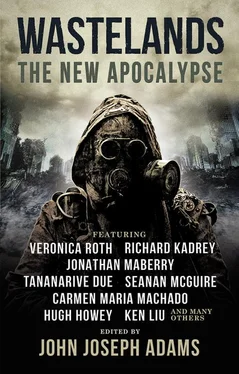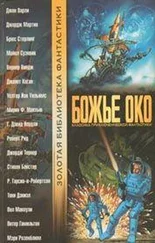The last time Kayn had been to this place, just before joining with the orgynism, the mechanisms that had kept the desert on both sides from intruding on this narrow bottleneck of civilization had already started to fail, and the pavement tiles had all felt gritty underfoot, a first sign that the sands had already begun to intrude. It was worse now. The drifts of gray sand now extended from one side of the narrow strip to another, fingers of pure decay well into the process of sundering the city’s two halves from one another. In the very center, the tiles had disintegrated completely, and Kayn did not just stumble over shifting sands but sink knee-deep into them. Something bit him in the leg. He cursed and dragged himself onto the tiles on the other side of the gap, pulling the buried creature along with him: He yanked it free of his leg, and examined the thing that had bitten him at arm’s length. It was a tiny thing as wide as his wrist, with a nearly human face but for the slit nose and lipless mouth, and little human arms, but a torso that trailed to a point rather than sprout legs. Everything below its waist looked like some turds do, when they’ve been inside the colon so long that they’ve taken on the wrinkles and folds of the surrounding tissue.
Kayn almost smashed the shit-thing dead, but then it said, “Don’t kill me!”
He grimaced but did not hurl it away as he would have wanted. “What are you?”
“I’m a man.”
Kayn said, “I don’t believe you.”
“Laugh all you want. I’m prepared for when the city’s gone. I’ll survive a lot longer than you. I’ll still be thriving in these sands when the sun goes cold.”
Blood, Kayn’s blood, dripped from the thing’s fangs.
Kayn said, “The sun’s gone cold. It made the news.”
“Colder,” the shit-thing clarified. “If it had gone out, we’d all be dead.”
“Cold enough. The desert won’t support life.”
“You’re half-right. It won’t support human life. You can’t go stumbling out there, trying to make a go of it, without freezing your nuts off. But life like me is still making a go of it, and will for a while yet. I’m the wave of the future. So feed me or let me go; I’m tired of your crap.”
Kayn almost hurled it to the tiles and stomped it to a greasy spot, but there are penalties to casual murder even in a city where murder can be arranged as a source of entertainment, and so he simply dropped it into the gap between the city’s decaying halves, and watched as it burrowed its way into the sands. He wondered if it was alone or if it was one member of a thriving colony, and if so, just what they fed on, down there, as it could not survive only on the blood of those like him, who stumbled in the crossing. And then he shrugged. In any city, even this one, it was possible to intercept any number of stories that had nothing to do with yourself, and if you did not want them to become your stories instead, you had to move on, banishing them to the status of footnotes or apocrypha.
He marched on, past the narrows, past a broken archway into the city’s other half, where after a while he began encountering other residents again. An emaciated but bearded woman, clad only in the few strips of clothing that had not yet rotted off her, nodded at him as she crossed an avenue, bearing a squirming human-shaped something in a sack on her shoulders. Two children, a rarity when he’d joined the orgynism, sat in a tree chattering nonsense at one another, and he spent a few minutes attempting to coax them down before realizing that, human or not, they were joined to the tree by stems, and enjoying life as its fruit. A man in a long multi-colored coat, ragged and bearded and mad, darted into a narrow alley lined with knives, that ripped pieces from him as he fled heedless into a potent darkness at its other end. Two other men played a variant of chess, only with many thousands of additional pawns and knights, across a game board so vast that their pieces had yet to contend with one another at the center of the board; both players were draped in drifts of dust, each one so involved in calculating the possible ramifications of any move that it might have been years since they had done anything but wait.
* * *
It was only after he entered a neighborhood where none of the buildings had doors, where they were just unmarked monoliths offering no clue as to what they might have contained, that he found a place that had once been one of his favorites. Prior civilizations would have called it an inn, or café, or restaurant. It served the same function with some adjustments for the nature of the way the city’s people interacted with one another. The last time he’d been here, centuries earlier, had been Poison Day and he had sat alongside two dozen other patrons there to soak up the novelty of dining and dying and dining and dying only to dine and die some more. It had been glorious. Today, of course, he didn’t want to feel his insides turn to fire inside him. He just wanted to plug himself back into whatever social intercourse the city could still provide, while making contacts for whatever grand joy came next. And so he entered the familiar room with its frescoes of hanging gardens, overjoyed to find it, if not full, then at least occupied by half a dozen others, including two old men locked in conversation, one lone man addressing his soup with what could only be described as grim determination, and a forlorn young woman with dark circles under her eyes, staring at her plate of something as if wholly uncertain what it was.
Kayn said, “Excuse me.”
The woman was silver-skinned, no doubt plated with the actual metal, a fashion choice that had been popular once upon a time. He supposed that it must be completely antiquarian now. So were her eyes, which were pink and lemur-large against cheeks buffed to a mirrored finish. She sat with her delicate hands palm-down on the table, flanking her bowl but making no move to lift it to her lips. But she was not forlorn enough to ignore Kayn’s hello. She met his gaze and released half-a-dozen syllables of purest gibberish in no language he knew, which was not all that unusual. Kayn had lived through entire renaissances of enthused linguistic experimentation where all of the city’s thousands had ordered the machines to design individual tongues for them, and had happily wandered the streets as citizens of Babel, content to not understand each other at all.
He pressed further: “Do you understand me?”
She cycled through a dozen tongues, some known to him, and some not, before arriving at the one he’d used to address her. “Can I help you?”
“Will you accept my company?”
“I wasn’t looking for company, but I don’t specifically object to it. I am willing to discuss anything but politics, morality, or the flattening effect of multiplying temporal paradoxes.”
“My full name is Adam Splendor Sadness Feline Igneous Ultimate Never Cul-De-Sac Untoward Synchronicity Leverage Cystic Beverage Arrogance Wholly Thirteen Cunnilingus Hummingbird Multiplication Kayn. You can call me Kayn.”
She provided her name, not a spoken syllable but a blast of tropical warmth, humid and filled with peat. “You can call me Peat. Please sit.”
“All right.” He sat opposite her, and let the table generate a meal for him, utensils and all. There was no mucking about with menus, sentient or otherwise. The establishment had tasted him and determined just what combination of foodstuffs was most appropriate for his current mood. What came, rising out of the solid table like the sun coming up on the horizon, was a bowl of something moving, something clearly sentient and alive, something that sang in soft, mournful despair as it awaited slaughter at the tip of his heated, six-pronged fork. He didn’t make it wait for very long, just stabbed through its tiny skull with one ruthless thrust, and lifted it to his mouth, feeling satiated as its death throes distributed what flavor it had. This had long been one of his favorite dishes. But today it was oily and bland, and when he was done chewing, it left an unpleasant gritty residue between his teeth. It was as if the sand of the surrounding desert had gotten into the synthesizers themselves.
Читать дальше


![Nick Cracknell - The Quiet Apocalypse [= Island Zero]](/books/28041/nick-cracknell-the-quiet-apocalypse-island-zero-thumb.webp)









